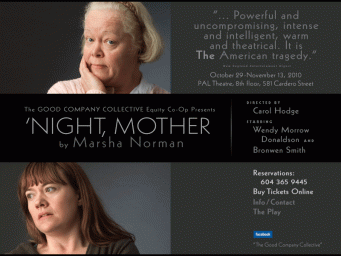Night, Mother is a play written by Marsha Norman in 1983. It deals with suicide. Jessie and her mother Thelma (who in the play is referred to as Mama) have a strained relationship. But it is strained only because of their circumstances. Jessie is an epileptic and she also suffers from extended bouts of depression for which she has no received any treatment. She has a son who is now an adult, but ultimately a disappointment, as it doesn’t seem he has amounted to anything. Mama is a woman who instead of seeing things the way they are, prefers to look at life the way that she wants to see it. She is an idealist in a much less than ideal situation. Jessie has decided to end her own life, and she tells her mother flat out what she plans on doing and why. Reading this play is tense and emotional, especially for anyone who has dealt with depression. The subject of depression, not to mention suicide is extremely touchy, but Jessie decides to tell her mother of her plans while she does her mother’s nails. Her mother is receptive to Jessie’s behavior because it seems as if she is actually in a good mood for once despite her cryptic confession. At the very end of the play, Jessie locks herself in her room, supposedly to perform the deed that she admitted she would complete before the next morning, and we hear a gunshot. Then, the play is over. The biggest question in this play is now one: Did Jessie really kill herself or not?
Certainly we heard the gunshot, and we have her confession, her conviction that she will have killed herself. However, we do not see a body. We do not see any blood. We do not see Mama walking into the room and bursting into a crazed emotional state. We see nothing. The play is simply over. Perhaps that is symbolic enough, with the ending of Jessie’s life, so ends the play. If you are an optimist, which I certainly am not, you could argue that perhaps she suffered an epileptic fit and fired the gun by accident. You could argue that maybe this was all a farce and that she only wanted to make a point, or that she was merely crying for help desperately for the treatment for her depression that she never received. Maybe she fired the gun into the air or out the window so that Mama would for once see things the way they are instead of living in her peachy-keen fantasy. I guess one can never really know. The argument could go on forever, and to me, this is what makes the play great. At the end of it, you care about Jessie because you have learned all her struggles, and you cannot help but to feel sorry for her. We as readers want to root for her. We hope that she could have pulled through, that certainly if she sought treatment, it would be better than that sort of ultimate escapism.
I loved this play. It was on the short side, and it read very fluidly. I am intrigued by the contemporary subject matter, and I can definitely see why it is a Pulitzer Prize winner. It makes you wonder what if.
